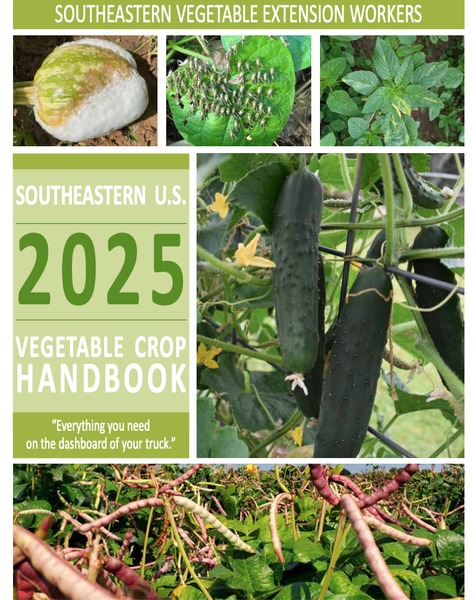The 2025 Southeast U.S. Vegetable Crop Handbook is now available. The handbook represents a joint effort among Extension specialists and researchers from 12 land-grant universities in the U.S. who work in the area of vegetable production. These specialists and researchers represent a wide array of disciplines: agricultural engineering, entomology, vegetable production, plant pathology, postharvest physiology, soil science, and weed science.
This handbook comprises up-to-the-minute information developed from research and Extension projects conducted across the Southeast. It contains the information that you need to manage your vegetable crops, including which varieties to plant, planting dates, fertilizer recommendations, cover crop selection and conservation tillage options, pesticide selection, grafting, fertigation, plasticulture, postharvest handling, alternative pest management tools, and suggestions, as well as many other topics.
Sections Include
- General Production Recommendations
- Specific Crop Recommendations
- Soil Pests—Their Detection and Control
- Calibrating Chemical Application Equipment
- Registered Fungicides, Insecticides, and Miticides For Vegetables
- Insect Control for Commercial Vegetables
- Disease Control for Commercial Vegetables
- Chemical Weed Control in Vegetable Crops
Download a digital version of the 2025 Southeast U.S. Vegetable Crop Handbook
Publication date: May 7, 2025
Recommendations for the use of agricultural chemicals are included in this publication as a convenience to the reader. The use of brand names and any mention or listing of commercial products or services in this publication does not imply endorsement by NC State University or N.C. A&T State University nor discrimination against similar products or services not mentioned. Individuals who use agricultural chemicals are responsible for ensuring that the intended use complies with current regulations and conforms to the product label. Be sure to obtain current information about usage regulations and examine a current product label before applying any chemical. For assistance, contact your local N.C. Cooperative Extension county center.
N.C. Cooperative Extension prohibits discrimination and harassment regardless of age, color, disability, family and marital status, gender identity, national origin, political beliefs, race, religion, sex (including pregnancy), sexual orientation and veteran status.

